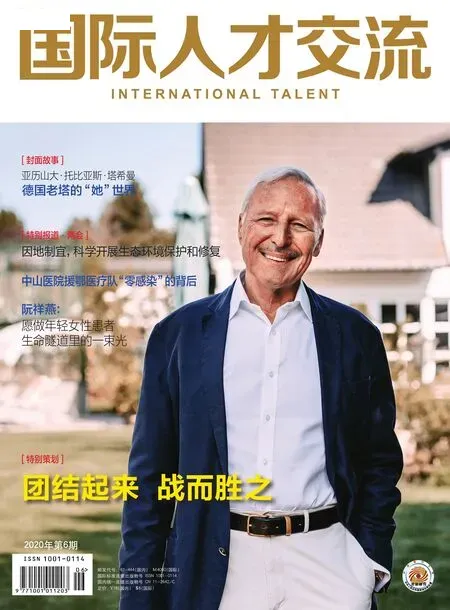中国传统:把消极转变为积极
文/龙安志(Laurence Brahm,美) 译/李艺雯
不久前,我在《中国日报》发表专栏文章《中国必胜》,指出中国人民和中华民族已经战胜了一个又一个危机,有足够的资金和决心再次战胜冠状病毒危机。
在中国生活的40年里,我亲身观察并参与了为应对各种挑战而作出的许多政策改革。我看到了中国人民团结合作的一贯作风,看到了政府的政策在面临危机和挑战时的细致把握。经验一次又一次地告诉我,当危机发生时,中国领导人以理性、清醒的头脑面对危机。中国人民也会很自觉地与政府的组织机构协同工作,共同应对这些危机时刻。
我生活在中国时,这种模式一直在重复出现,我相信这是植根于儒家传统。道家和佛家的哲学影响对民族的文化心理的影响深远,使人们能够灵活应对危机,并在面对逆境时看到积极的希望。这种从消极中看到积极的能力,并利用这种感知将最困难的情况转化为优势,是中国文化植根于人民思想中根深蒂固的表现。
在繁荣时期,事情进展顺利,每个人都在做自己的事情。但在危机时刻,每个人都团结在一起。这是中国文化的独特之处,使人民可以共同反馈共同应对。这就是我们在这场令人难以置信的新冠病毒危机中所看到的情况。世界上还有哪里能够因为政府的政策协调力而使得十亿以上的人待在家里自我隔离呢?这是对前所未有的流行病作出的集体反应。世界上很少有地方是每个人都能以一种耐心的集体力量携手抗疫。这是中国和中国人民独有的。
在关键时刻,湖北省多地采取了封城措施。这不仅是对本国人民的责任,也是对国际社会的责任。我们现在都意识到这种冠状病毒的致命威力,以及它无法解释地在空气中快速传播的事实。封锁和隔离的能力是能够遏制任何病毒的第一步。但是,如果你想象一下,为了防止疫情在中国其他地区乃至整个世界传播,湖北封城的规模之大令人难以置信。这是全球人道主义责任的真正行动,甚至以中国自己的经济和社会成本作为代价。
Not too long ago, I wrote a column forChina Daily, “China Shall Overcome,” observing that the Chinese people and nation have overcome one crisis after another in the past, and have the wherewithal and determination to do this again facing the coronavirus crisis.
I have both observed and participated in many of the reforms and policies of China to overcome challenges over the four decades living here. I have seen a consistent pattern of unity and cooperation among the Chinese people, and meticulous coordination of government policies when faced with a crisis or challenge. Experience has shown me, time and again, when a crisis occurs, China’s leadership faces it with a rational clear-headedness. Something seems to kick into the subconscious of both people and they work together in synergy with the organizational institutions of government to overcome these moments of crisis.
This pattern has been re-occurring throughout my life living in China and I believe that it is an innate aspect that has roots in Confucian tradition. Philosophical influences that are both Taoist and Buddhist embedded in the national cultural psyche allow for adept flexibility in response to crisis and a vision of positive hope when faced with negative adversity. This ability to see positive through negative and to use that perception to turn even the most dif ficult situations into advantages is a deeply rooted part of Chinese culture and the Chinese people.
At times of prosperity, when things are going well, everybody is out there doing their own thing. But in those moments of crisis everybody comes together. This is unique to the Chinese culture that allows them to respond and work together. This is what we see happening during this incredible coronavirus crisis. Where on earth could you have 100 billion plus people stay at home and self-quarantine as part of a coordinated government policy? This represents a collective response to an unprecedented epidemic. There are very few places in the world where everyone can come together in a patient collective force. This is unique to China and its people.
China has cordoned and locked down Hubei province. This is an act of responsibility not only to its own people, but to the global community as well. We are all aware now of the deathly potency of this coronavirus and the unexplainable occurrence of its rapid airborne spread. The ability to lock down and isolate is the first step to be able to contain any virus.But if you imagine the scale of what is happening in Hubei province to prevent this from affecting other parts of China and the world as a whole,it is incredible. This is a true act of global humanitarian responsibility.Even at China’s own economic and social costs.
When you talk about humanitarianism this is an act in the global interest. This ability of the Chinese culture, social fabric of its people and the organizational capability of the institutions that have been established in the country that allow China to respond quickly,decisively and collectively to a crisis of unbelievable and unforeseeable proportion.
Under such circumstances where the threat of this coronavirus is a threat to anybody, we can see everybody is collectively and patiently staying at home. Self-isolation and working at home remotely, working around the dangers in order to meet this challenge. I don’t think one would see this response in any of the western countries whose politicians and mainstream media are so quick to criticize China for everything it does.This is a distinctive, collective response among people to work and bond together in order to get through this crisis together.
One of the reasons why China is able to respond so effectively is the system of macro-management that evolved to address economic reform but is now being used to address a health and humanitarian crisis. Throughout the 1980s-1990s a system evolved of state guidance of the economy, together with checks and balances to prevent economic crisis, and the ability to tighten and loosen valves to allow the market to function in free- flow, or to use administrative means to guide the market to ward more stable conditions to prevent volatility.This is in the interest of everyone collectively rather than the selfinterest of a few.
Of course this coronavirus is having a terrible impact on China’s economy. Shops are closed, movement of goods restricted. This will have implications throughout the entire chain of production, transport and supplies not only in China but globally.
We see America isolationist policies causing alienation of other nations such as China. So it is foreseeable that we could see more collaborative arrangements in Asia, not only in economic policy and business,but also in combatting disease and crisis. This may be just a natural evolution of the times we live in now.
Once we get through this stage of containment and control of the coronavirus and its spread, then China will enter a new stage of its own economic growth, a re-boot period. The same types of reforms applied to business and enterprise and economy now need to be applied to the health care sector. These are areas that now offer opportunity for more state investment and private investment and there will be a new growth era with breakthroughs In science, technology and A.I. for health care.I believe these are areas where China will lead in bringing together other countries of the region, such as India, where there are similar challenges with population concentrations, water and food security,and health care. We could see a new regional growth and economic revitalization. It is a question of using negative to create positive. That is core to Chinese philosophy and culture.
当你谈论人道主义时,这是一种符合全球利益的行为。中国文化的这种能力、中国人民的社会结构以及中国已经建立的机构的组织能力,使中国能够迅速、果断和集体地对难以置信并且无法预见的危机作出反应。
在新冠肺炎疫情对任何人都构成威胁的情况下,我们可以看到大家都在集体、耐心地待在家里。大家都自我隔离,在家远程工作,在危险中工作,以迎接这一挑战。我认为在西方国家不会看到这样的反应,然而他们的政客和主流媒体却如此迅速地批评中国所做的一切。这是中国人民为了共同应对这场危机而共同努力、团结起来的一种独特的集体反应。
中国之所以能够作出如此有效的反应,原因之一是曾用于应对经济改革的中国的宏观管理体系现在正被用于应对卫生和人道主义危机。在20世纪80年代至90年代,中国以一种政府指导的经济系统,来防止经济危机。系统可采取收紧和放松的方式,保证市场的自由流通功能,也可使用行政手段来保护稳定的市场环境,以防止波动。这符合所有人的集体利益,而不是少数人的私利。
当然,此次的新冠病毒正在对中国的经济产生着可怕的影响。商店关门,货物流通受到限制。这将对中国乃至全球的整个生产、运输和供应链条产生影响。
我们看到美国的孤立主义政策导致了其他国家的疏远,比如中国。因此,可以预见的是,我们可以在亚洲看到更多的合作,不仅在经济政策和商业方面,而且是在抗击疾病和危机方面。这或许是我们现在生活的时代的自然演变。
一旦我们度过了这个遏制和控制新冠病毒及其传播的阶段,那么中国将进入一个新的经济增长阶段,一个重新启动的时期。适用于商业、企业和经济的改革现在需要适用于卫生保健部门。这些领域现在需要更多的国家投资和私募投资机会,我们将迎来一个在科学、技术和医疗人工智能方面取得突破的新增长时代。我相信,在这些领域,中国将发挥带头作用,把该地区的其他国家团结起来,例如印度,那里同样在人口密集、水和粮食安全以及医疗保健方面面临着类似的挑战。我们可以看到新的区域增长和经济振兴。把消极转变为积极,这是中国哲学和文化的核心。

